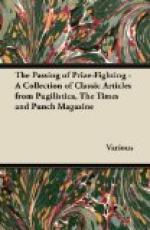Mr. E.B. OSBORN, who has written The Maid with Wings, and other Fantasies Grave to Gay (LANE), will perhaps not altogether thank me for saving that among the Other Fantasies I throughout preferred the grave to the gay. The Maid with Wings itself is a beautiful little piece of imagination—the vision of the Maid of France comforting an English boy during his last moments out in No Man’s Land. The thing is well and delicately done, with a reserve that may encourage the judicious to hope for good work in the future from a pen that is (I fancy) as yet somewhat new. On the other hand, I must confess that the Gaiety left me (though this, of course, may be an isolated experience) with sides unshaken. “Callisthenes at Cambridge,” for example, is but little removed from the article that, to my certain knowledge, has padded school and ’Varsity magazines since such began to be. Still, I liked the plea for Protection against foreign imports in literature and art by way of helping the native producer, though even here some condensation would, I thought, have sharpened the point. But, after all, reviewers are dull dogs to move to laughter (as no doubt Mr. OSBORN will now agree), so I hope he will rest content with my genuine appreciation of his graver passages, and will be encouraged to give us something more ambitious and less open to the suspicion of book-making.
* * * * *
The Letters of a Soldier: 1914-1915 (CONSTABLE) are letters to a mother; letters also of an artist, and full of an exquisite sensibility, a fine candour. I can best give you an impression of the charming personality of this young French soldier (who survived his first great battle, to be reported missing after the counter-attack, since when no news of him has reached his friends), by quoting little sentences of his, and if you don’t want to know more of him after reading them then nothing I can say will be of any use: “The true death would be to live in a conquered country, above all for me, whose art would perish.... If you could only see the confidence of the little forest animals, such as the field-mice! They were as pretty as a Japanese print, with the inside of their ears like a rosy shell.... How is it possible to think of Schumann as a barbarian?... I am happy to have felt myself responsive to all these blows, and my hope lies in the thought that they will have forged my soul.... Spinoza is a most valuable aid in the trenches.... We are in billets after the great battle, and this time I saw it all. I did my duty; I knew that by the feeling of my men for me. But the best are dead. We gained our object ... I send you my whole love. Whatever comes to pass, life has had its beauty.” And then no more.
* * * * *




